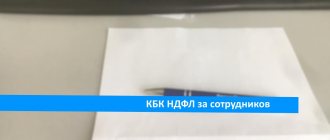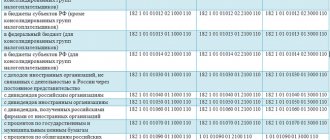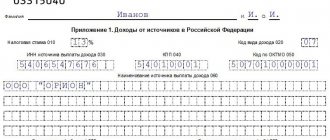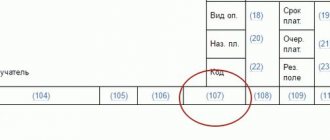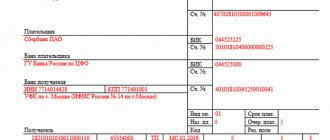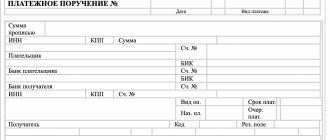Budget Classification Codes (BCC)
KBK is an abbreviation for “budget classification code.”
Budget classification codes are approved by the Russian Ministry of Finance. This is a long chain of numbers, representing a special code of 20 digits, which are combined into 7 groups. Each number in this sequence of numbers encodes a specific target group of budget revenues into the financial system of the Russian Federation. Decoding of groups of numbers in KBK 2018-2019
- 1-3 Code indicating the addressee for whom the cash receipts are intended
- 4 Show a group of cash receipts
- 5-6 Reflects tax code
- 7-11 Elements revealing the item and subitem of income
- 12-13 Reflect the level of the budget into which funds are planned to be received
- 14-17 Indicate the reason for the financial transaction
- 18-20 Reflects the category of income received by a government department
KBK is most often used by accountants and bank employees when filling out field 104 in payment orders. By comparing the order of numbers in the KBK groups, you can determine where the payment came from, what its purpose is, who exactly is the addressee and for what purposes the funds are being transferred, so redirecting them further will not be difficult.
The KBK code is a 20-digit digital encoding of budget expenses and revenues, including tax payments, which are considered budget revenues. KBK is entered in field 104 of the payment slip and is a mandatory detail of the payment document.
Banks control that this field is not left blank, since they need to know to which budget the payment of the company or entrepreneur should be directed. However, banks do not check the correctness of the encoding.
KBK 18210102010012100110 - penalties for personal income tax
If personal income tax was not paid on time, the tax authorities will require the company to pay penalties on it. Charged for each day of delay. The amount increases according to the refinancing rate of the Central Bank. The payment order is executed in the same way as when paying the tax itself.
Field No. 104 also indicates the type of payment in the form of a twenty-digit code, but the numbers are slightly different. The difference concerns characters 14 to 17 inclusive. During a regular tax payment, 1000 is put in this place, and when a penalty is transferred - 2100. Otherwise, the code does not differ from the usual one. The Federal Tax Service also acts as the manager of the financial flow; cash flows are directed to the same budget of the subject.
Since 2020, KBK 182 1 0100 110 has been in force for the payment of penalties on interest tax on bonds in rubles.
Fixed payments for individual entrepreneurs “for themselves”
BCC for VAT depends on the type of transaction. Separate codes are provided for paying taxes, penalties and fines for:
- sales of goods in Russia (see previous section);
- import of property from EAEU member countries (administrator is the tax service);
- imports from other countries (the administrator is the customs service).
| Operation | KBK for tax | KBK on penalties | KBC on fines |
| Sales in Russia | 182 1 0300 110 | 182 1 0300 110 | 182 1 0300 110 |
| Import from EAEU member countries through the Federal Tax Service | 182 1 0400 110 | 182 1 0400 110 | 182 1 0400 110 |
| Import through FCS | 153 1 0400 110 | 153 1 0400 110 | 153 1 0400 110 |
The error can be easily corrected by clarifying the payment. But this should be done as quickly as possible to avoid penalties and fines for late payment of VAT.
Submit an application to change the BCC to your territorial tax office.
Fill out the payment form
Decoding KBK
This number combination refers to the personal income tax that an organization pays for its employees. It consists of twenty digits. The quantity is divided into groups, each of which has a specific meaning:
- the first three characters indicate the manager of financial resources. 182 is the Federal Tax Service;
- the next three digits indicate the type of contribution. 101 – income tax;
- two signs indicate where the funds go. 02 – regional;
- five categories indicate the purpose: 02010 – insurance part of the employees’ labor pension;
- a four-digit number indicates the type of payment: 1000 – amount of contribution, debt, arrears;
- the latter indicate the type of income: 110 – tax.
Read more: Russian bailiff hotline for free
In 2020, the law defines a number of cases when this code is not used when paying personal income tax:
- the tax agent is the source of income;
- an individual conducts private practice as a notary, lawyer, individual entrepreneur;
- a foreign citizen, having a patent, works for hire and makes fixed advance payments;
- money was received from the sale of personal property under a rental agreement;
- financial assets were won in a lottery, received for a work of art or an invention by the legal successor of the creator;
In 2020, a new code was introduced for the tax on interest on ruble bonds of domestic organizations - 182 1 0100 110.
Other sets of numbers are used for fines and penalties: KBK 18210102010013000110 and KBK 18210102010012100110.
KBK 18210301000010000110 and other VAT codes
The encodings in VAT payments vary depending on the transaction for which the tax is transferred. All BCCs for tax are shown in Table 2.
Table 2. KBK 18210301000010000110 and other VAT codes
| Operation | Payment administrator | KBK for VAT | ||
| Tax | Penalty | Fines | ||
Sales in Russia:
| Federal Tax Service | 182 1 0300 110 | 182 1 0300 110 | 182 1 0300 110 |
| Import of property to Russia from the territory of the EAEU | 182 1 0400 110 | 182 1 0400 110 | 182 1 0400 110 | |
| Importing property into Russia from outside the EAEU | FCS | 153 1 0400 110 | 153 1 0400 110 | 153 1 0400 110 |
How to find out the BCC for a specific payment?
Unfortunately, the Russian Ministry of Finance annually makes changes to the BCC coding due to a revision of the budget structure, the introduction of new tax regimes, compensation and benefits. New BCCs must be approved by the Ministry of Justice (Ministry of Justice of the Russian Federation), then the information is published on the official website of the Federal Tax Service, so the current data reaches accountants with a delay. Sending a budget payment with an incorrect BCC leads to incorrect distribution of funds, so the payer is charged penalties. To avoid errors in the BCC number, an accountant or individual should clarify the details in one of the following ways.
Request details at a branch or on the bank’s website (relevant for standard payments). If the client regularly pays property tax, personal income tax or other common payment, the current details can be checked with the operator or customer service hotline employee. Banks that work primarily with legal entities often encounter BCC and have up-to-date information. Individuals paying taxes by receipt must use only the details from the payment order.
Checking the BCC on the Federal Tax Service website (www.nalog.ru/rn77/taxation/kbk/). An accountant or taxpayer can request a KBK code for a specific payment using the Federal Tax Service client portal. Having indicated the payer status (legal entities, citizens or individual entrepreneurs), the client should select the type of payment (for example, professional income tax). The Federal Tax Service system will automatically download a list of current BCCs. This method is used by accountants who make several tax payments for standard business transactions (for example, paying VAT).
Checking the CSC with the responsible inspector. A taxpayer can contact an inspector of the Federal Tax Service in person or by telephone during reception hours for citizens (organizations). Contact information for the tax inspectorate can be found on the Federal Tax Service website; in order to avoid arrears and erroneous payments, you should regularly check with the inspector about the status of the company’s personal account. Tax inspectors will be the first to learn new details and codes for payments to the budget.
Monitoring changes in legislation. Using the sites consultant.ru, nalog.ru, as well as news sites, the taxpayer can find out about the release of the next order of the Ministry of Finance, make changes to payment details, avoiding errors. For example, online magazines for accountants regularly publish a list of updated BCC and other details for taxpayers.
KBK for simplified tax system in 2020
In simplified terms, BCCs depend on the applied object of taxation. Simplified people with a “income-expenditure” object should carefully consider the choice of the KBK when paying the minimum tax: since 2020, a single code has been used for both paying the single tax and the minimum one. If the minimum tax is paid for periods earlier than 2020, a separate BCC is used for it.
| KBK | Decoding |
| KBK simplified tax system 6% 2020 (“income”) | |
| 182 1 0500 110 | Single tax under the simplified tax system “income” |
| 182 1 0500 110 | penalties |
| 182 1 0500 110 | fines |
| KBK simplified tax system “income minus expenses” 2020 | |
| 182 1 0500 110 | Single tax under the simplified tax system “income minus expenses” (incl., simplifiers transfer the minimum tax to this KBK simplified tax system in 2019) |
| 182 1 0500 110 | penalties |
| 182 1 0500 110 | fines |
| 182 1 0500 110 | Minimum tax under the simplified tax system (only for tax periods expired before January 1, 2020) |
| 182 1 0500 110 | penalties |
| 182 1 0500 110 | fines |
KBK Directory
KBK 2020 – The Ministry of Finance introduces new codes for some tax payments. 12 new positions in the order look like this:
- 15310402210010000110 – fee for the import of dark marine fuel into the state;
- 15310807500010000110 – for excise stamps with a two-dimensional barcode;
- 16010807490010000110 – to pay the state fee for obtaining federal special stamps with a two-dimensional barcode;
- 18210101022020000110 – taxation of income for fulfilling the terms of contracts for the development of gas and oil fields in the Far East;
- 18210302390010000110 – excise tax on petroleum products processing;
- 18210302400010000110 – combination of excise tax on dark marine fuel produced within the country;
- 18210607000010000110 – single tax payment for individuals;
- 18210705010010000110 – combination for deduction of tax on earnings from the extraction of hydrocarbons in the subsoil located in certain territories (see Article 333.45 of the Tax Code);
- 18210705020010000110 – combination for deductions for earnings from the extraction of hydrocarbons in the subsoil located in certain areas (see Article 333.45 of the Tax Code);
- 18210705030010000110 – for deducting tax on earnings from the extraction of hydrocarbons in the subsoil located in certain areas (see articles of the Tax Code);
- 18210705040010000110 – for deduction of tax on earnings from the extraction of hydrocarbons in the subsoil located in certain areas (see articles of the Tax Code);
- 18210402210010000110 – Excise tax on dark marine fuel imported into the territory of the Russian Federation.
These and other recent BCCs required for correctly filling out “payments” are already freely available; we present the most used ones, as well as those in which payers most often make mistakes.
It is recommended that you read the full order on the official portal of the Ministry of Finance.
Code KBK NDFL
No new KBK codes have been added for 2020. The previous ones continue to be used, we present the table:
Field 104 of the payment order is filled in with a code depending on the category of the person sending the payment.
Payment of personal income tax is made no later than the next day after the employee’s payday. If an employee who is temporarily disabled is provided with money, personal income tax must be sent no later than the last day of the month in which the employee received his benefit.
Code KBK penalty
Penalties are charged on late payments and are one of the most common purposes of payment.
Under personal income tax, penalties are charged for late payments, and each month deprives an irresponsible taxpayer of 1 thousand rubles. Each expired 2-NDFL certificate costs 200 rubles. An error in the tax information contained is punishable by a penalty of 500 rubles for each report in which an error was made. Use the following combinations to pay:
Monetary sanctions for VAT are presented in the table:
Penalties on insurance premiums:
Code KBK USN income
In the simplified taxation system, the codes have not changed. The main thing to remember is that in 2020 a common code for minimum and single deductions was introduced, and payments of the minimum tax for a period of time earlier than 2020 require a separate classification combination.
KBK: patent tax system 2020
The patent is paid by entrepreneurs, choosing the BCC that corresponds to the type of budget.
| KBK | Decoding |
| 182 1 0500 110 | Patent tax credited to the budgets of city districts |
| 182 1 0500 110 | penalties |
| 182 1 0500 110 | fines |
| 182 1 0500 110 | Patent tax credited to the budgets of municipal districts |
| 182 1 0500 110 | penalties |
| 182 1 0500 110 | fines |
| 182 1 0500 110 | Patent tax credited to the budgets of federal cities of Moscow and St. Petersburg |
| 182 1 0500 110 | penalties |
| 182 1 0500 110 | fines |
What is it needed for
Government agencies
The code is necessary to ensure that the procedure for processing an array of information on business activities in a given region is as quickly and simplified as possible. Rosstat constantly processes a lot of data, and the OKTMO code helps systematize information received from individual entrepreneurs and legal entities.
Any business activity is “tied” to one territory or another; using the OKTMO code, the State Statistics Service can easily determine which one. By studying the structure of the code, you can consistently determine the territorial affiliation of the subject of taxation:
The code contains the information:
- the first two characters are a subject of the Russian Federation;
- the next 3 characters are a city or an association equivalent to it according to classification;
- the remaining positions are the locality of the organization or individual entrepreneur.
Attention! In 11-digit OKTMO, the first 8 digits similarly characterize a large municipal entity, and 9–11 positions characterize a settlement within it
For business entities
An individual entrepreneur or the management of an organization needs to know their OKTMO, because it must be regularly entered in a special field on many important documents, namely:
- tax reporting in the simplified tax system and UTII modes (declaration under the simplified tax system and UTII);
- value added tax declaration;
- income declarations for individuals;
- land tax documents;
- transport tax declaration;
- mining reporting;
- documents on taxes on gambling business;
- excise tax reports.
In addition to reporting forms, the code must be affixed to payment orders for all tax deductions, including penalties and fines.
Attention! A list of all documentation where OKTMO indication is required is contained on the official website of the Federal Tax Service of the Russian Federation.
KBK: land tax 2020 for legal entities
When paying land tax, companies choose BCC in accordance with the territorial location of the site. The choice of land tax penalties by the KBK, as well as “penalty” codes, also depends on the location of the site.
| KBK | Decoding |
| 182 1 0600 110 | Land tax from organizations if the site is located within the boundaries of intra-city municipalities of federal cities |
| 182 1 0600 110 | penalties |
| 182 1 0600 110 | fines |
| 182 1 0600 110 | Land tax for organizations if the site is located within the boundaries of urban districts |
| 182 1 0600 110 | penalties |
| 182 1 0600 110 | fines |
| 182 1 0600 110 | Land tax for organizations if the site is located within the boundaries of urban districts with intra-city division |
| 182 1 0600 110 | penalties |
| 182 1 0600 110 | fines |
| 182 1 0600 110 | Land tax for organizations whose land plots are located within the boundaries of intracity districts |
| 182 1 0600 110 | penalties |
| 182 1 0600 110 | fines |
| 182 1 0600 110 | Land tax for organizations whose land plots are located within the boundaries of inter-settlement territories |
| 182 1 0600 110 | penalties |
| 182 1 0600 110 | fines |
| 182 1 0600 110 | Land tax for organizations whose land plots are located within the boundaries of rural settlements |
| 182 1 0600 110 | penalties |
| 182 1 0600 110 | fines |
| 182 1 0600 110 | Land tax for organizations whose land plots are located within the boundaries of urban settlements |
| 182 1 0600 110 | penalties |
| 182 1 0600 110 | fines |
KBK 18210102010011000110 – what tax?
KBK are intended to simplify mutual settlements between legal entities and the budget. In 2020, there were changes in the classifier and now taxpayers are required to apply new codes. KBK 18210102010011000110 its decoding in 2020 means the transfer of funds under the personal income tax item accrued from the income of hired employees. Accordingly, only a tax agent can transfer tax using this code.
If the details are incorrectly specified, the money will not be received for the intended purpose, and this leads to misunderstandings on the part of the fiscal authorities. To confirm payment, you will need to submit an application for transfer and supporting reporting documents.
KBK 18210102010011000110 transcript
It is not a fact that the tax office will agree with your statements. In this case, taxpayers face penalties, since the enterprise will record arrears on its tax liability.
It is interesting for every manager and accountant to know what tax is transferred to individual entrepreneurs using this detail. Please note that entrepreneurs pay personal income tax for their employees using a different BCC. According to Order of the Ministry of Finance of the Russian Federation No. 65n KBK 18210102010011000110 is valid only in relation to personal income tax, which was accrued from the income of employees, with the exception of personal income tax calculated in accordance with Articles 227, 227.1, 228 of the Tax Code of the Russian Federation.
Read more: How to include a satellite in a public cadastral map
What taxes does an individual entrepreneur pay?
KBK: State duties 2020
| KBK | Decoding |
| 153 1 0800 110 | State duty for the issuance of excise stamps with a two-dimensional bar code containing the identifier of the unified state automated information system for recording the volume of production and turnover of ethyl alcohol, alcoholic and alcohol-containing products (USAIS) for labeling alcoholic products |
| 160 1 0800 110 | State duty for the issuance of federal special stamps with a two-dimensional bar code containing the identifier of the unified state automated information system for recording the volume of production and turnover of ethyl alcohol, alcoholic and alcohol-containing products (USAIS) for labeling alcoholic products |
| 182 1 0800 110 | State duty for re-issuing a certificate of registration with the tax authority (when applying through multifunctional centers - MFC) |
KBK 18210102010013000110 - fines for personal income tax
If the company has paid the required amount, including accrued penalties, without waiting for the tax authorities’ demands, you can expect that no other sanctions will follow. But in practice, during on-site inspections, fines are also often imposed. If the case is considered by the court, it will take into account the presence or absence of the entrepreneur’s guilt, but his difficult financial situation and other circumstances are rarely taken into account. The Letter of the Ministry of Finance dated 04.-4.2017 states that in case of late payment of personal income tax, the deadline does not exempt from liability.
Read more: What time is it legal to sell alcohol in Moscow?
For these reasons, late payment often results in a fine. There is also a special KBK for its payment - 18210102010013000110. Like the code for the penalty, it differs from the usual one by 14-17 characters.
A special code has been used since 2020 for penalties related to bond interest: 182 1 0100 110.
To make payments, enterprises use an approved form of document - a payment order. The purpose of the payment is encrypted with a specific budget classification code (BCC), it is reflected in line “104” of the document. What is the meaning of KBK 18210102010011000110 in 2020 and what tax to pay using this code will be discussed in the article.
Concept
Budget classification codes are twenty-digit combinations of a special digital code.
They are used to group items of the state budget, their preparation and execution, as well as the generation of reporting on their implementation. Code structure in the case of budget revenues:
- Administrator (digits 1 to 3 represent the chief administrator of budget revenues).
- Types of income (4th figure - group, 5 and 6 - subgroup, 7 and 8 - article, 9 to 11 - subarticle, 12 and 13 - element).
- Program/subprogram (digits 14 to 17 – subtype of income).
- EKD (economic classification of income, from digits 18 to 20, classifies operations of the public administration sector).
The first group of the KBK structure consists of three characters. The “Group” component of the types of income of KBK is represented by one sign, the subgroup – by two.
The signs in the subgroup can be the following:
- 1 – taxes;
- 2 – receipts on a gratuitous basis;
- 3 – income from business activities.
An article is represented by two signs, a sub-item by three, an element by two, which determine the type of budget.
Structure of the element code and its meaning:
- 01 – federal budget;
- 02 – budget of a constituent entity of the Russian Federation;
- 03 – local;
- 04 – urban district;
- 05 – municipal district;
- 06 – Pension Fund;
- 07 – FSS of the Russian Federation;
- 08 – Federal Compulsory Medical Insurance Fund of the Russian Federation;
- 09 – territorial Compulsory Medical Insurance Fund;
- 10 – settlement.
The income subtype (program) is presented as follows:
- 1000 – payment of the main payment;
- 2100 – penalties;
- 3000 – fines;
- 2200 – interest deduction.
The EKD specifies the income code and can be represented by three values.
The BCC of expenses is represented by the following structure with five elements:
- Chief manager of budget funds (1st to 3rd digits, administrator).
- Section and subsection (digits 4 to 7, two characters each).
- Target expense item (digits 8 to 14, digits 11 and 12 – program, digits 13 and 14 – subprogram).
- Type of expenses (15 to 17 digits, three digits).
- ECR, which classifies public sector operations related to budget expenditures).
The section and subsection are specified:
- 01 00 – 15 subsections – issues of a national nature;
- 02 00 – 8 – national defense;
- 03 00 – 13 – law enforcement and national security;
- 04 00 – 11 – national economy;
- 05 00 – 4 – housing and communal services;
- 06 00 – 4 – environmental protection;
- 07 00 – 9 – education;
- 08 00 – 6 – culture, cinematography, media;
- 09 00 – 4 – sports and healthcare;
- 10 00 – 6 – social policy;
- 11 00 – 4 – interbudgetary transfers.
Income element
The next block is represented by a series of numbers that are divided into subgroups. Let's look at each of them:
- The first subgroup determines the type and type of income: 1 – tax payment, 2 – gratuitous payments, 3 – payments from individual entrepreneurs;
- The second subgroup, showing the general and main purpose of the payment, is part of the income. Here is a list of such combinations: 01 - income tax; 02 - payment of social contributions; 03 - tax on goods sold in Russia; 04 - tax on goods manufactured and imported outside the country; 05 - income tax; 06 - property payment; 07 - payment from the resource user; 08 - state duty; 09 - penalties, penalties for canceled taxes; 10 - income from export-import activities; 11 - income from state property through its rental; 12 - payment when using natural resources; 13 - profit from paid services of government agencies; 14 - income from the sale of state property; 15 - fines and other duties; 16 - compensation for harm caused;
- The third group consists of two numbers indicating the article and three numbers indicating the subarticle;
- The last group determines one or another budget level based on the information received.
How to find out the budget classification code? The BCC on any receipt will be easy to read if you know the purpose of each number.
What are the consequences of an error in the KBK?
If the payment purpose code is specified incorrectly, the payment will be transferred to the budget, but it will not be distributed correctly there, which means that the state will not actually receive it. The result may be the same as if the money had not been transferred at all: the tax office will count the arrears under a certain item. At the same time, if the BCC is simply mixed up, there may be an overpayment under another item.
As a result, the tax office will issue a demand for payment of arrears, a fine for late payment of tax or a fee and penalties for late payment. This situation is extremely unpleasant for a conscientious entrepreneur who paid the tax on time, whose entire fault lies in confusion with numerous CBCs.
The usual procedure for an entrepreneur when an error is detected in the KBK
- The most important thing is to make sure that the error did not lead to non-receipt of income to the budget, otherwise it will be considered that the funds were not paid, with the payer being fully responsible for this.
- Submit to your tax accounting office a statement about the detected error and a request to clarify the basis, type and affiliation of the transfer of funds, if necessary, the tax period or tax payer status.
- The application must be accompanied by payment orders for which the tax was paid and received by the budget.
- If necessary, a reconciliation of paid taxes is carried out jointly with the inspector (a report is drawn up about it).
- After a few days (the period is not defined by law), a decision is made to clarify this payment and is handed over to the applicant.
IMPORTANT! When a payment is clarified, it is considered completed on the day the payment order is submitted with an incorrect BCC, and not on the day the decision on clarification and offset is received. Thus, there is no delay in obligatory payment, which provides for penalties.
Let's look at various cases that occur due to errors in the CBC and analyze what an entrepreneur should do.
- The inspectorate assessed penalties for non-payment of taxes. If there was a beneficial request from the payer to offset the amount paid, then you should additionally ask the tax office to recalculate the accrued penalties. If the tax office refuses to do this, going to court will most likely allow for a recalculation (there is a rich case law with similar precedents).
- The BCC does not correspond to the payment specified in the assignment. If the error is “within one tax”, for example, the KBK is indicated on the USN-6, and the payment basis is indicated on the USN-15, then the tax office usually easily makes a re-offset. If the KBK does not completely correspond to the basis of the payment, for example, a businessman was going to pay personal income tax, but indicated the KBK belonging to the VAT, the tax office often refuses to clarify, but the court is almost always on the side of the taxpayer.
- Due to an error in the KBK, insurance premiums were unpaid. If the funds do not reach the required treasury account, this is almost inevitably fraught with fines and penalties. The entrepreneur should repeat the payment as quickly as possible with the correct details in order to reduce the amount of possible penalties. Then the money paid by mistake must be returned (you can also count it against future payments). To do this, an application is sent to the authority to whose account the money was transferred erroneously. Failure to comply with a request for a refund or re-credit is a reason to go to court.
- The funds entered the planned fund, but under the wrong heading. For example, the payment slip indicated the KBK for the funded portion of the pension, but they intended to pay for the insurance portion. In such cases, contributions are still considered to have been made on time, and you must proceed in the same way as under the usual procedure. The court can help with any problems with a fund that refuses to make a recalculation, and an illegal demand for payment of arrears and the accrual of penalties.
REMEMBER! According to the law, an error in the KBK is not a reason for which the payment will not be considered transferred. The payment order contains additional information indicating the purpose of the payment and its recipient, therefore, if it is indicated correctly, there is and cannot be a reason for penalties against the entrepreneur; other decisions can be challenged in court.

